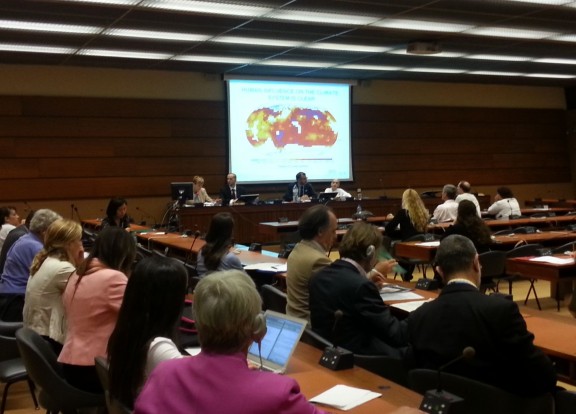 On Thursday 19 June, a side event to the UN Human Rights Council in Geneva, Switzerland, on “Climate Change and Human Rights – an Ethics perspective”, was organized by the Geneva Interfaith Forum on Climate Change, Environment and Human Rights (GIFCCEHR), of which the WCC is a founder member, and co-sponsored by a dozen civil society organizations. In the side event, which gathered around forty participants, a scientist, a representative from a Foundation and a religious leader stressed climate change is seriously affecting human rights.
On Thursday 19 June, a side event to the UN Human Rights Council in Geneva, Switzerland, on “Climate Change and Human Rights – an Ethics perspective”, was organized by the Geneva Interfaith Forum on Climate Change, Environment and Human Rights (GIFCCEHR), of which the WCC is a founder member, and co-sponsored by a dozen civil society organizations. In the side event, which gathered around forty participants, a scientist, a representative from a Foundation and a religious leader stressed climate change is seriously affecting human rights.
The panel discussion was introduced and moderated by Dr Guillermo Kerber, Programme Executive of the WCC on Care for Creation and Climate Justice, who highlighted the relevance ethics have in the discussion on climate change and human rights. He reminded GIFCCEHR together with NGOs and some states have been calling for the establishment of a Special Procedure mandate on Human Rights and Climate Change.
The first speaker of the panel was Dr Renate Christ, Secretary of the Intergovernmental Panel on Climate Change (IPCC). Taking into account the Fifth Assessment Report (AR5) of IPCC, she exposed how climate change is having many adverse effects on peoples most basic rights such as health, livelihoods. Climate change is increasing inequality and affecting territorial integrity and security. In this context, AR5 highlights that reducing CO2 emissions continues to be crucial to effectively reduce the impacts of climate change. She suggested that climate action based on science can help protect the basic human rights of individuals both in this generation and in future ones, as climate change poses questions to intergenerational justice.
Mr Daniel Murphy, from the Environmental Justice Foundation, based on the work of the Foundation in various parts of the world, showed how climate change is provoking forced displacement and thus seriously affecting the human rights of people all over the world. Taking this into account the Environmental Justice Foundation has joined others who are calling the UN Human Rights Council to appoint a Special Rapporteur on human rights and climate change.
Sister Jayanti, European Director of the Brahma Kumaris World Spiritual University, exposed how they are implementing concrete projects on agriculture and solar energy in India to address climate change. She said that it is the ethics behind such initiatives – that of fairness and justice – what makes them valuable contributions. She called to bring together “head and heart” to acknowledge the spiritual consciousness and ethics we share as global family with values such as peace, love and joy.
Interventions from the floor brought the consequences of climate change in Papua New Guinea, the relationship between scientific evidence and responsibility of certain states on CO2 emissions, the need to engage business in addressing climate change.
The discussion on Human Rights and Climate change will continue at the Human Rights Council which is discussing a new resolution on the topic. It was further stressed at the side event, the need to link these discussions with the UN Framework Convention on Climate Change process and the UN Climate Summit which will take place in September 2014 in New York.